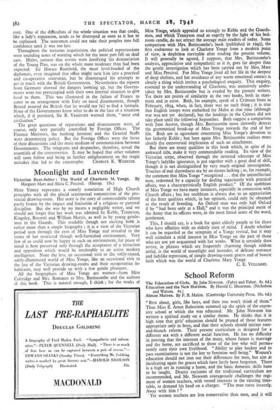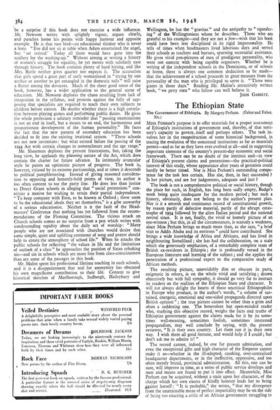School Reform
"RUN about, girls, like boys, and then you won't think of them." Thus Miss E. Amot Roberston summed up the spirit of the expen- sive school at which she was educated. Mr. John Newsom has written a spirited study on a similar theme. He thinks that it is high time that girls' education should be pruned of those features appropriate only to boys and that their schools should initiate root- and-branch reform. Their present curriculum is designed for a different sex with a different social function. He has no difficulty in proving that the interests of the many, whose future is marriage and the home, are sacrificed to those of the few who will perma-f nearly earn their own livelihood. "Ability to play hockey and to pass examinations is not the key to feminine well being." Women's education should not iron out their differences for men, but aim at inculcating again the graces which have lately been forgotten. There is a high art in running a home, and the basic domestic skills have to be taught. Drastic excisions of the traditional curriculum are recommended, and Mr. Newsom courageously challenges the regi- ment of women teachers, with vested interests in the existing time- table, to demand his head on a charger. "The man raves insanely. Away with him " Yet women teachers are less conservative than men, And it will
be a surprise if this book does not exercise a wide influence. Mr. Newsom writes with splightly vigour, argues clearly, and punches home his points with happy humour and apposite example. He is that rare bird—an educational thinker who is never a bore. "Eve did not sit at table when Adam entertained the angel, but sat retired.' Today all three would have gone into the scullery for the washing-up." Without aiming at writing a history of women's struggle for equality, he yet moves with scholarly ease through history. The book contains plenty of hard hitting, and like Mrs. Battle neither gives quarter nor expects it. The accusation that girls spend a great part of early womanhood in "trying by one artifice or another to get entangled in the domestic toils" will raise a flutter among the dovecots. Much of the sheer good sense of the book, however, has a wider application to the general scene of education. M.;. Newsom deplores the chaos resulting from lack of integration in the syllabus, and protests against the folly of sup- posing that specialists are required to teach their own subjects to children before sixteen. He doubts whether there is a high correla- tion between playing games and perfortning public duties. He gives the whole profession a salutary reminder that "passing examinations is not an end in itself, but a means to an end, the harmonious and proportionate development of the human personality." He faces the fact that the new pattern of secondary education has been decided to fit into the existing irrational system. "These schools are not new inventions : but what existed before the passing of the 1944 Act with certain changes in nomenclature and the age range."
Mr. Shearman deplores the present frustrations, but, taking the long view, he applauds the planning nature of the Act, which does contain the charter for future advance. In intimately avuncular style he paints an optimistic picture of progress. The book is, however, vitiated by its extreme partisanship, and at times it descends to political pamphleteering. Instead of giving reasoned considera- tion to opposing and honestly-held points of view, its author is too often content to toe the party line. He does less than justice to Direct Grant schools in alleging that "social pretensions" con- stitute a motive for wishing to retain their partial independence. "To keep company with Eton, to be known at Oxford these seem to be the educational ideals they set themselves," is a gibe unworthy of a serious educationist. Neither is it the fault of the Head- masters' Conference that nothing has yet followed from the recom- mendations of the Fleming Committee. The vicious attack on Church schools comes as no surprise from a pen which writes with condescending tepidity about the daily act of worship : "Many people who are not associated with churches would desire that
some simple, quiet and uplifting ceremony of song and prayer should help to create the atmosphere of school life." When he attacks the public schools for reflecting "the values in life and the limitations of outlook of a class" he approaches the position of Satan rebuking sin—and sin in schools which are more free from class-consciousness than are some of the passages in this book. Mr. Maim spent his professional lifetime teaching in such schools, and it is a disappointment that zeal for anonymity has obscured his own magnificent contribution to their life. Content to give historical sketches of Marlborough, Sedbergh, Haileybury and Wellington, he has the " gravitas " and the antipathy to " squealer- ing " of the Wellingtonians whom he describes. Those who are grateful to his example—and they are not a few—wish that his book could have been less disciplined in its rigid impersonality. He tells of times when headmasters lived laborious days and served their schools as teachers and bursars, spurning secretarial assistance. He gives vivid pen-pictures of men of prodigious personality, who were not content with being capable organisers. Whether he is
writing of the independent schools in the Dominions, or of schools at home, there is always one common deduction to be made—
that the achievementiof a school proceeds in great measure from the personality of the man who is privileged to serve it. "There were giants in those days." Reading Mr. Main's attractively written book, "we petty men" who follow can well believe it.
jOHN GARRETT.



































 Previous page
Previous page